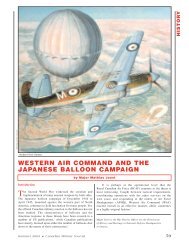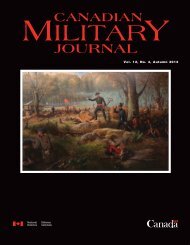MILITARY
CA JOURNAL - Revue militaire canadienne
CA JOURNAL - Revue militaire canadienne
- No tags were found...
Create successful ePaper yourself
Turn your PDF publications into a flip-book with our unique Google optimized e-Paper software.
Credit: AKG 1-G33-A1822-10 (akg images)<br />
Credit: AKG 1-H55-A1 (akg-images)<br />
Johann Wolfgang Goethe. Painting by Heinrich Kolbe<br />
of the Enlightenment. 5 There is no doubt that the Enlightenment<br />
was itself a very complex movement that should not be reduced<br />
to a few platitudes. Taken as a whole, the Enlightenment (circa<br />
1687-1789) sought to establish the intellectual foundation for a<br />
political system without divine sanction, a religion without mystery,<br />
a morality without dogma. Such was the edifice the<br />
Enlightenment thinkers believed man now had to erect.<br />
Science would have to become something more than an<br />
intellectual pastime; it would have to develop into a power capable<br />
of harnessing the forces of nature to the service of mankind.<br />
Science was the key to happiness. With respect to the material<br />
world, once it was in his power, man could order it for his own<br />
benefits and for the happiness of future generations. Such are the<br />
“notes” by which the 18 th century is readily identifiable. 6 But for<br />
the Romantics, from Coleridge, Chateaubriand, Herder, and Heine,<br />
through Schelling and Hegel, a vision of the Enlightenment<br />
emerged that was as cold, timeless, monotonous, and as calculating<br />
as the bourgeois who had supposedly embraced it. 7 In their<br />
view, the Enlightenment enshrined mechanism as the model to<br />
explain all phenomena of matter, life and mind. Teleological<br />
causes, such as Thomism backed by the Catholic church, had<br />
been inverted in Bacon’s terms as “barren virgins.” “Any work<br />
they supposedly accomplished could be turned over to efficient<br />
mechanical causes.” 8<br />
Romanticists, scientists, philosophers, historians, as well as<br />
artists, were reacting against what they considered the desiccated<br />
rationalism that prevailed during the Enlightenment period in<br />
Europe. Romanticism as an intellectual movement, therefore, can<br />
be understood as an overwhelming international tendency which<br />
swept across Europe and Russia at the end of the 18 th Century and<br />
beginning of the 19 th Century in reaction to earlier neo-classicism,<br />
Georg Friedrich Wilhelm Hegel. Portrait by Jakob Schlesinger<br />
mechanism, and rationalism embodied in Enlightenment thought.<br />
More than simply a return to nature, the realm of imagination or<br />
feeling, it was a synthesizing nature that transformed the entire<br />
character of thought, sensibility, and art. Romantic scientists and<br />
philosophers, especially those in Germany such as Georg Hegel,<br />
Wolfgang Goethe, Friedrich and Auguste Schlegal, and the renowned<br />
historian Leopold von Ranke, were determined to look at nature<br />
and society holistically, to see ‘wholes’ and relationships, rather<br />
than discrete events and phenomena. In other words, they rejected<br />
the analytical, reductionist, and linear approach to breaking things<br />
apart to study them that was so characteristic of the methodology<br />
embedded in Enlightenment philosophy.<br />
One of the leading intellectual historians of the 20 th Century,<br />
Isaiah Berlin, characterized the Romantic movement as follows:<br />
The importance of Romanticism is that it is the largest recent<br />
movement to transform the lives and thought of the Western world.<br />
It seems to me to be the biggest single shift in the consciousness of<br />
the West that has occurred, and all of the shifts which have occurred<br />
in the course of the 19 th and 20 th centuries appear to me in comparison<br />
less important and at any rate deeply influenced by it. 9<br />
Since Clausewitz was born in 1780 and died in 1831, his life<br />
spanned almost exactly the very height of the Romantic Movement,<br />
especially in Germany where it was openly philosophical and allembracing.<br />
Clausewitz was certainly not a professional philosopher,<br />
but he was, nonetheless, a man of a particularly philosophical bent<br />
of mind. He read voraciously and broadly, far beyond the field of<br />
military history. He was also scientifically literate, reading mathematical<br />
treatises and attending lectures just as science was turning<br />
to the serious study of biology and advances in the theories of statistics<br />
and probabilities. His major work, On War, still sought to<br />
38 Canadian Military Journal • Vol. 13, No. 4, Autumn 2013





